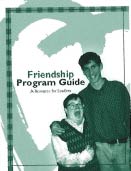Updated April, 2025
The family of God is not complete unless all are present—people of all ages and races and physical abilities. What do disabilities have to do with worship and justice? People with disabilities were the last group in the United States to receive legal rights. Those with mental retardation were not allowed to go to school until 1974; they were not allowed to live in communities (in group homes) until the 1980s. (See box below for some statistics about people with disabilities.)
Here’s what happened when one church set out to make sure it was including people who have disabilities in the family of God.
About ten years ago Plymouth Heights Christian Reformed Church in Grand Rapids, Michigan, appointed a Disability Committee to oversee ministry to people with disabilities within their congregation. They began by coming up with a list of people who had any sort of disability—from attention deficit disorder to muscular dystrophy to stroke victims—and then asking how the church could best minister to them and their families. In thinking about people with disabilities and worship, Plymouth Heights started considering their worship space, their worship services, even their parking lots. The timing was important because several years later, when the time came for them to renovate their worship space and enlarge their church facilities, they were ready.
The Worship Space
During the process of remodeling, Plymouth Heights was very intentional about making room for people with disabilities. They replaced the pews with new ones without side barriers. They included pew cutouts to make room for wheelchairs. They moved the pews farther apart so people with walkers could get in and out of them more easily. They made their platform wheelchair accessible. They improved the lighting in their sanctuary to make reading easier.
All of these changes helped create a more welcoming space for the many people with mental disabilities who attend Plymouth Heights Church because of the active Friendship program it sponsors (see box on p. 24).
The Worship Service
Worship planners became more conscious and careful about introducing each person and each part of the worship service for those who could not read. They intentionally included repetition of short phrases in parts of the service each week, such as having the worship leader follow the reading of Scripture with “The Word of the Lord” and having the people reply, “Thanks be to God.” Such phrases can be memorized and spoken by those who cannot follow a written bulletin.
They also invited members of a Friendship class to sing as a choir in some of their worship services and were careful to include songs people were learning in Friendship class in congregational singing.
More importantly, worship planners invited people with mental retardation to sit with different families, never more than one to a family, so that they were integrated throughout the worshiping community. As a result, the church has become known as a welcoming place for everyone.
The Parking Lot
By becoming intentional about creating space for all of God’s children to worship together, Plymouth Heights started to grow. Word spread that they were an accessible and friendly church, and more and more people started coming. Soon the twelve parking spaces reserved for people with disabilities were not enough. Now Plymouth Heights has a waiting list of people who want to get involved in the Friendship program. Visitors notice that there’s something different about this church. By combining their concern for justice for people with disabilities and their worship, Plymouth Heights has grown into a fuller awareness and experience of the family of God. Members comment, “The family of God is not complete unless all are present”—including those with disabilities.

Friendship Ministries
Friendship Ministries is a not-for-profit organization whose mission is to help churches and organizations around the world share God’s love with people who have mental impairments. It has grown into a ministry that encompasses more than thirty denominations in North America. The ministry is expanding to Hispanic churches in the United States and into Latin America where Amistad, the Spanish version of Friendship Bible Studies, is used.
The Friendship program model includes a group session that brings people with mental impairments and leaders together for praise and worship and a Bible story, followed by a time when friends meet individually with a mentor to learn together what it means to be a part of God’s family. Friendship’s greatest impact happens in this one-on-one relationship.
Friendship Bible Studies, a curriculum for youth and adults with mental impairments, forms the basis for Friendship Ministries. It includes Bible stories from both the Old and New Testaments as well as a series of short courses dealing with issues people with mental impairments face in their everyday lives and a course based on the Ten Commandments.
For information about starting a Friendship group in your church, order a free sample pack from Friendship Ministries:
1-800-333-8300
www.Friendship.org
E-mail: friendship@friendship.org
—Marlene Brands, Friendship curriculum editor
